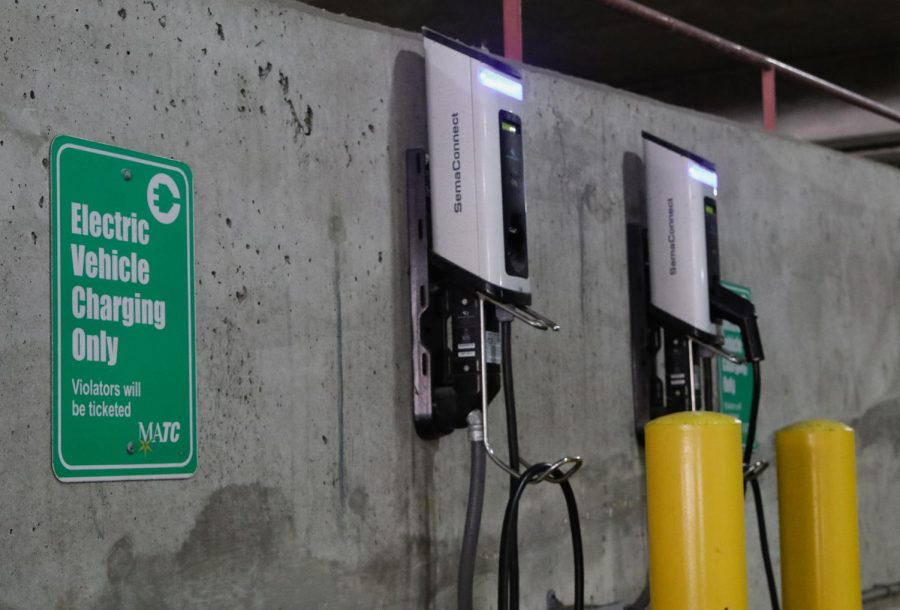If you need to charge your electric car at Marquette, it’s going to be about a 10-minute walk south of the Marquette Law School.
Currently, the closest electric vehicle charging station to campus is at the Wisconsin Department of Natural Resources at 1027 St. Paul Ave. It costs around $2 per hour to charge a vehicle at the DNR.
Other schools in the area, such as UW-Milwaukee and Milwaukee Area Technical College, both have multiple EV charging stations on campus.
However, at the moment there is no timetable as to when or if EV charging will come to Marquette’s campus. But, Chelsea Malacara, sustainability and management coordinator, said it is something her team is “actively working on.”
Malacara said that around 3% of Marquette registered vehicles last year were either hybrid or electric.
“It’s in that top five priority list because it’s something that we should offer and a lot of other college campuses do,” Malacara said.
Chris Collins, a sophomore in the College of Communication, owns an electric vehicle on campus and said he charges his car at the Bayshore Mall, which is a 12-minute drive north of campus.
“I know a lot of small high schools back home that have chargers so I was shocked to see that Marquette doesn’t have any,” Collins said.
Marquette has a campus sustainability pledge that details the university’s commitment to care for the environment in conjunction with its Jesuit values.
“If Marquette truly believes in innovation and environmental justice, there’s no reason we shouldn’t have chargers on campus,” Collins said.
Bringing EV charging stations to campus is not something that is solely under Malacara’s jurisdiction. She said it would likely be a team effort across departments such as facilities, planning and management, financial and purchasing depending on what route the university decides to take.
“There’s kind of a lot of different logistics that we’re working out, they’re not nothing, it’s nothing that is a barrier to us not doing it, it’s just figuring out what the best system is, and then funding it and how to move forward,” Malacara said.
Some things the university is considering where the chargers would be located as well as if the chargers would be available for those outside of the Marquette community to use.
“What happens when the car is done being charged? Like, is there space for the person who’s using the charger to move somewhere else in the garage? Or are they going to like be spending their break time or something driving around looking for parking? How do we communicate with people that they’re done using chargers? Do we use an app?” Malacara said. “There’s kind of like a lot of logistics that, you might not think about.”
There’s also the task of figuring out how to fund the project. Malacara said the team is still considering all options and seeing if Marquette is eligible for any federal or state programs, such as the Inflation Reduction Act, that could help bring EV charging to campus.
“Electrification is coming. The private sector has spoken. The major auto manufacturers are retooling and have announced ambitious plans to transition to producing predominantly electric vehicles in the near future. That is good for our environment because it can dramatically reduce emissions from burning fossil fuels,” Craig Thompson, Wisconsin secretary of transportation, said in a statement.
The Wisconsin Department of Motor Vehicles reported that around 8,900 electric vehicles were registered in 2021. That was up over 40% from 2020. Some models of new cars now have at least a hybrid option if not fully electric.
Ayman EL-Refaie, professor of electrical engineering, said most cars have an internal combustion engine that runs on diesel or gas. During the combustion of that fuel, the output results in kinetic energy or a mechanical movement that moves the car forward.
“So an internal combustion engine has an efficiency of like 50%. They are very inefficient. So basically, the combustion process 50% of it is released as emissions, that’s why they are very bad for the environment, right with an electric vehicle, you don’t have any emissions pretty much,” EL-Refaie said.
In hybrid vehicles, there is both an internal combustion engine and batteries. With pure EV vehicles, there is the complete elimination of the internal combustion engine.
“All you have are batteries, and the batteries through the power electronics, driving an electric motor, and that electric motor is what really propels the vehicle. So, those typically have certain ranges, they tell you that if the battery is fully charged, you can drive this vehicle for 50 miles to 100 miles because before the battery gets completely depleted and those are the ones that you need to charge all the time,” EL-Refaie, said.
In addition to environmental impact, some may consider going hybrid or fully electric for other reasons.
“(Electric vehicles) are still more expensive than its conventional counterpart. But what you need to factor in is that during the lifetime of the vehicle, you’re not really paying for gas. Yes, you’re gonna pay for electricity, but obviously, the price of electricity is much much cheaper than the peak for gas you know, so it should be over the lifetime of the vehicle still economically beneficial to own a hybrid or a pure EV,” EL-Refaie said.
Between 2021 and 2022, the number of electric cars sold worldwide has continued to rise. With the growing popularity of EVs in Wisconsin and nationwide, Malacara said it is more important now to offer EV charging than ever before.
“We know that more and more people are going to be going to own an electric vehicle,” Malacara said. “So obviously, it’s in our best interest to bring electric vehicle charging stations to campus for our faculty or staff, students, visitors, things like that.”
This story was written by Megan Woolard. She can be reached at [email protected] or on Twitter @MeganWoolard4





